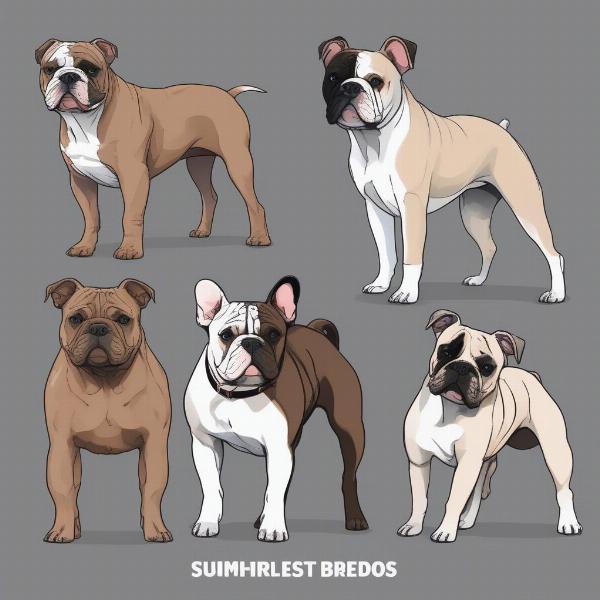Stout dog breeds, known for their compact and muscular builds, often pack a lot of personality into a smaller frame. These dogs can be excellent companions for various lifestyles, from apartment dwellers to active families. Understanding the characteristics of stout dog breeds is crucial for choosing the right fit for your home. This article will explore what defines a stout dog breed, highlighting popular examples and discussing important considerations for their care and well-being.
 Examples of Stout Dog Breeds
Examples of Stout Dog Breeds
What Makes a Dog Breed “Stout”?
The term “stout” describes a dog with a robust, thickset body type. These dogs are typically shorter than average, with broad chests, well-developed muscles, and strong bones. While “stout” isn’t an official breed classification, it’s a useful descriptor for certain breeds that share these physical characteristics. They often exude an air of strength and resilience, despite their smaller stature. Is stout a breed of dog? No, it’s a descriptive term.
Popular Stout Dog Breeds
Several breeds embody the “stout” physique. Here are some popular examples:
- English Bulldog: Known for their wrinkled faces and gentle nature, English Bulldogs are a classic example of a stout breed. They are loyal and affectionate companions, perfect for laid-back lifestyles.
- Staffordshire Bull Terrier: Often referred to as “Staffies,” these dogs are energetic and playful, despite their muscular build. They are intelligent and eager to please, making them great family dogs with proper training.
- French Bulldog: These smaller cousins of the English Bulldog are gaining popularity rapidly. They are adaptable and playful, making them excellent companions for city living.
- American Staffordshire Terrier: Often confused with the Pit Bull, “Am Staffs” are powerful and protective, requiring experienced owners who can provide consistent training and socialization.
- Bullmastiff: A large and imposing breed, the Bullmastiff combines strength and gentleness. They are loyal guardians, but their size requires ample space and responsible ownership.
Caring for a Stout Dog Breed
While each breed has unique needs, several general considerations apply to caring for stout dogs:
Exercise and Enrichment:
Though compact, stout breeds still need regular exercise to maintain a healthy weight and prevent boredom. Short, brisk walks, playtime in a fenced yard, and engaging toys can provide physical and mental stimulation.
Nutrition:
A balanced diet formulated for their breed and activity level is essential. Overfeeding can lead to obesity, which can exacerbate health issues common in some stout breeds. What should I feed my stout dog? High-quality dog food appropriate for their age, breed size, and activity level is recommended. Consult your veterinarian for personalized advice.
Health Considerations:
Some stout breeds are prone to specific health conditions, such as brachycephalic respiratory syndrome in breeds with short noses. Regular veterinary checkups and preventative care are vital for maintaining their well-being.
Finding Your Perfect Stout Companion
Choosing a stout dog breed requires careful consideration of your lifestyle, experience with dogs, and ability to meet their specific needs. Researching different breeds and speaking with reputable breeders or rescue organizations can help you make an informed decision. A rottweiler dog house is an example of breed-specific needs. Do you enjoy visiting dog friendly breweries boston? Consider if the breed is suitable for such activities. You might even want to bring a pot dog along!
Conclusion
Stout dog breeds offer a unique blend of strength, personality, and companionship. By understanding their characteristics and providing appropriate care, you can enjoy a fulfilling relationship with your compact canine friend. Choosing a stout dog is a big decision, ensure you have researched the breed and are prepared for the responsibility. Are you looking for a loyal companion, an energetic playmate, or a gentle giant? A stout dog breed might just be the perfect fit. Considering a Lead Dog Brewing Conan as a name for your new pup? Make sure it suits their personality!
FAQ
- Are all stout dog breeds good with children? While many are known to be good with children, proper training and socialization are essential for any dog, regardless of breed.
- Do stout dogs require a lot of exercise? While they may not need as much exercise as some larger breeds, regular physical and mental stimulation is crucial for their well-being.
- What are common health issues in stout breeds? Some stout breeds are prone to breathing problems, joint issues, and skin allergies. Regular veterinary care is important.
- Are stout dog breeds suitable for apartment living? Some stout breeds adapt well to apartment living, provided they receive sufficient exercise and mental stimulation.
- Where can I find a reputable breeder or rescue organization? Researching online and contacting local breed clubs can help you find reputable breeders or rescue organizations.
- How much grooming do stout dog breeds require? Grooming needs vary by breed, but regular brushing and occasional bathing are typically sufficient.
- Are stout dogs good for first-time owners? Some stout breeds are suitable for first-time owners, while others require more experienced handlers.
Related Articles
About ILM Dog
ILM Dog is your comprehensive resource for expert dog care advice, covering everything from breed selection and health care to training and nutrition. We are passionate about providing valuable information to dog owners worldwide, empowering them to provide the best possible care for their furry companions. Whether you’re a new dog owner or a seasoned enthusiast, ILM Dog offers practical tips and insights to enhance your dog’s well-being. Contact us for personalized advice at [email protected] or +44 20-3965-8624. Visit ILM Dog for more information on dog breeds, health, training, and more!